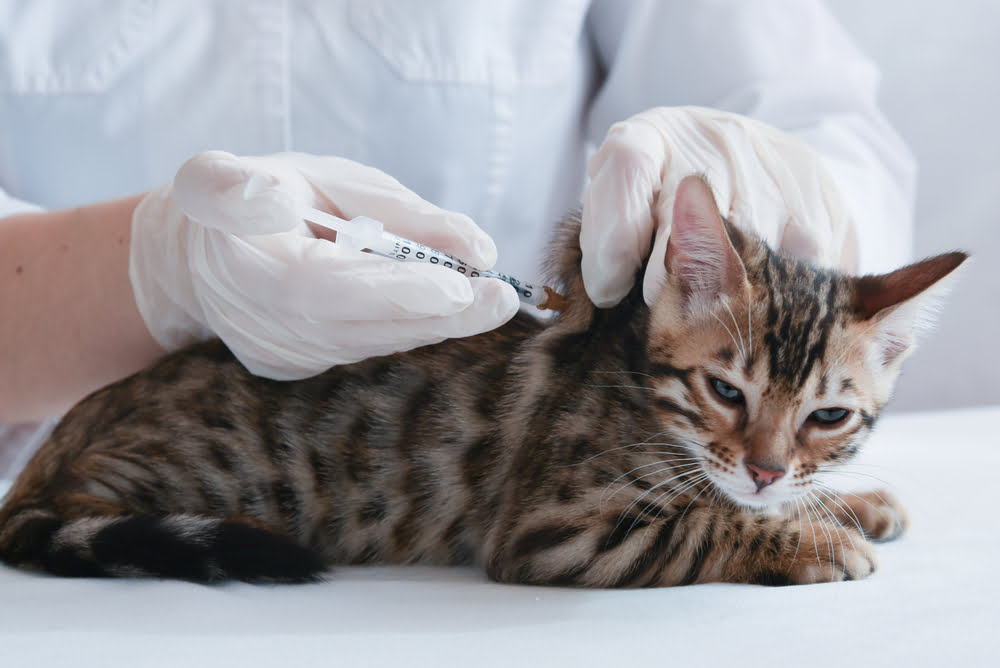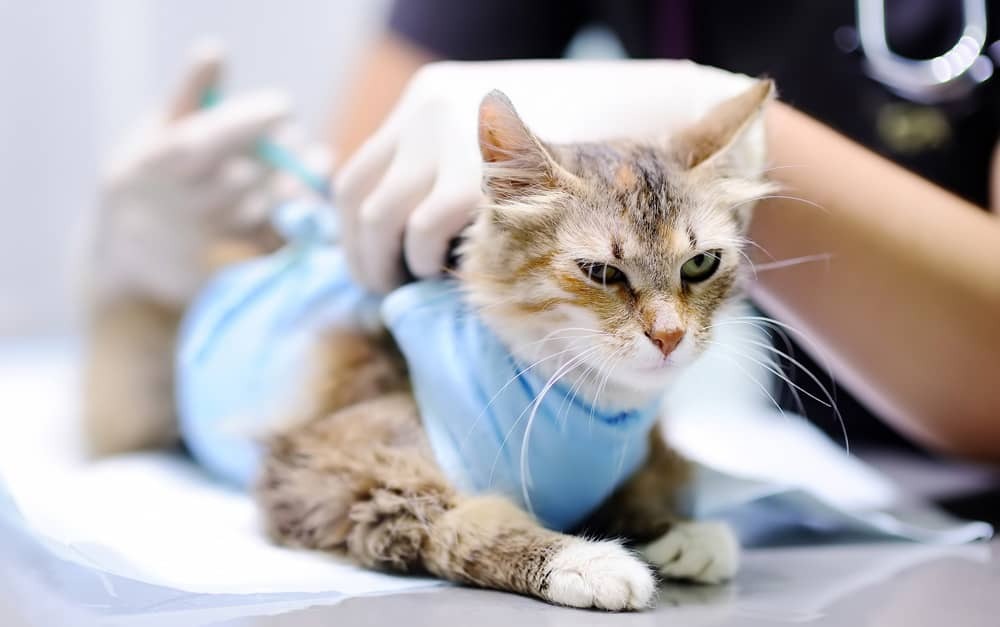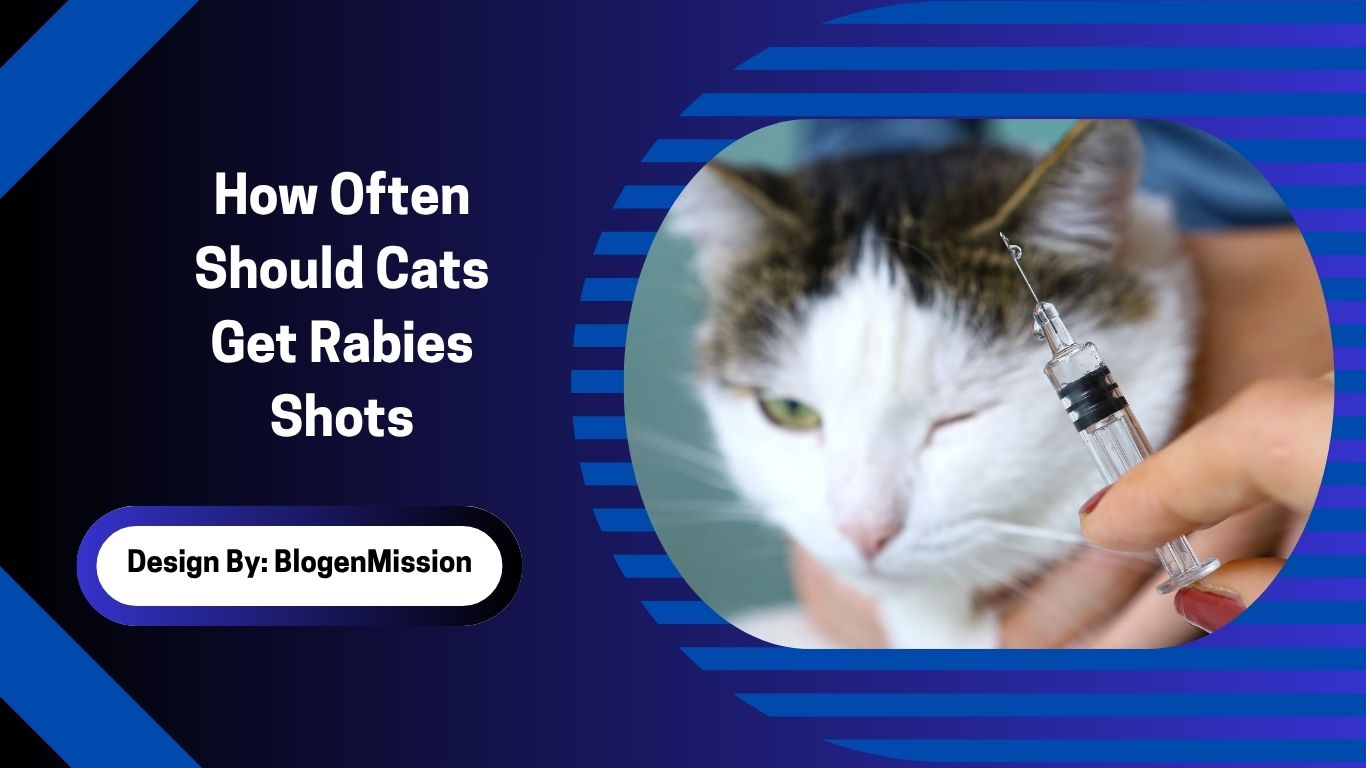Cats need rabies shots starting at 12–16 weeks, with boosters every 1 or 3 years based on vaccine type and state laws, even for indoor cats, to ensure safety and legal compliance.
Rabies is one of the most dangerous viral infections that can affect cats and humans alike. Even though it’s largely preventable, rabies is fatal once symptoms appear, which is why rabies vaccine for cats is considered not just essential but legally mandatory in most places.
Vaccinating your cat against rabies is part of preventative care for cats and aligns with broader public health rabies protocols. But how often do cats really need a rabies shot? Is it every year? Every three years? And what about indoor cats that never step outside?
In this comprehensive guide, we’ll answer these questions, explore the rabies vaccination schedule, review state laws for rabies vaccination, and provide practical insights backed by veterinarian-recommended vaccine timelines.
Why Rabies Vaccination Is So Important for Cats?
Rabies is a viral disease that attacks the nervous system. Once a cat contracts rabies, there is no cure. The disease causes severe neurological symptoms and leads to death in nearly 100% of cases. That’s why prevention through rabies vaccine for cats is non-negotiable.
The rabies virus can be transmitted through the bite or scratch of an infected animal. Common carriers include raccoons, bats, skunks, and foxes. Even indoor cats can be exposed if a bat enters the home or if the cat escapes outside. Because of this risk, the rabies vaccine is considered a core vaccine for cats, meaning it is essential for all felines regardless of lifestyle.
Feline Immunization Guidelines: Understanding the Basics

Veterinarians follow established feline immunization guidelines provided by organizations like the American Association of Feline Practitioners (AAFP) and the American Veterinary Medical Association (AVMA). These guidelines recommend rabies vaccination for every cat, starting when they are kittens.
Typically, the first rabies vaccine for cats is given at 12 to 16 weeks of age, depending on local laws. After the initial shot, cats will receive a rabies booster based on the type of vaccine used—either a 1-year or 3-year vaccine.
It’s important to understand the rabies vaccine expiration because once it lapses, your cat is no longer considered protected or legally compliant.
Yearly vs. Triennial Rabies Shots: What’s the Difference?
There are two types of rabies vaccines available for cats:
- One-year rabies vaccine: Requires annual boosters.
- Three-year rabies vaccine: Requires a booster every three years.
Both options provide effective immunity, but your choice may depend on state vaccination laws, veterinarian recommendation, and your cat’s individual health history.
Cat Rabies Vaccination Schedule Example
| Cat’s Age | Vaccine Type | Next Booster Due |
| 12–16 weeks | Initial rabies shot | 1 year later |
| 1 year old | Booster (1-year or 3-year) | Next due in 1 or 3 years |
| Ongoing | Based on previous dose | Stay on schedule |
Missing a booster means your cat may need to restart the series depending on local law. Stay consistent to maintain lifelong immunity from rabies.
Indoor Cats and Rabies Vaccination Requirements
Do indoor cats need rabies shots? Absolutely.
Many cat owners assume that if their cat stays indoors, rabies vaccination isn’t necessary. However, this assumption is risky. Cats can escape, wildlife can enter the home, and state laws for rabies vaccination often don’t differentiate between indoor and outdoor cats.
From a public health rabies protocol standpoint, vaccinating all pets ensures wider community protection and reduces potential liability for owners.
Additionally, most boarding facilities, groomers, and even airlines require proof of current rabies vaccination, regardless of your cat’s lifestyle.
State Laws for Rabies Vaccination
In the United States, rabies vaccine requirements are governed at the state or municipal level. Some states require annual vaccination, while others accept triennial rabies shots. There are even cases where counties or cities have additional rules.
Key points:
- Most states mandate rabies shots for all cats.
- Medical exemptions may be allowed but must be issued by a licensed veterinarian.
- Proof of vaccination is required for licensing in many jurisdictions.
Failing to comply with local animal health regulations can result in fines or quarantine of your pet in the event of a bite or exposure.
Rabies Vaccine Side Effects in Cats
The rabies vaccine is generally very safe for cats. However, as with any medical procedure, side effects can occur. These are usually mild and temporary.
Common side effects include:
- Low energy or drowsiness for 24 hours
- Mild swelling at the injection site
- Decreased appetite
- Slight fever
In rare cases, more serious reactions like allergic responses can occur. Discuss any past vaccine sensitivities with your vet before administering boosters.
Cats with serious medical conditions may qualify for vaccination exemptions, though these are rare and must be documented.
What Happens If You Skip a Rabies Vaccine?
If your cat misses a booster or never receives a rabies shot, several risks arise:
- Medical Risk: The cat becomes vulnerable to a fatal virus. Even one unvaccinated bite from a rabid animal could be lethal.
- Legal Risk: You may be fined or have your cat quarantined. In some jurisdictions, an unvaccinated cat that bites someone may be euthanized for rabies testing.
- Public Health Risk: Your cat could unknowingly become a vector for disease transmission.
Skipping shots undermines the foundation of pet vaccination compliance and puts your pet and community at risk.
How Long Does a Cat Rabies Shot Last?
The duration of immunity depends on the vaccine type:
- 1-year vaccine: Effective for 12 months.
- 3-year vaccine: Effective for 36 months.
It’s important to note that if a triennial vaccine is given late, it may be treated as an expired shot, requiring a new series.
Ask your vet to clearly specify the vaccine type on the rabies certificate and always track the rabies vaccine expiration date.
Vaccination and Veterinary Immunology: A Long-Term View

Thanks to veterinary immunology, we know that lifelong immunity from rabies is achievable with regular vaccination. However, immunity varies between individual cats, and boosters ensure antibody levels stay high enough to fend off infection.
Even if your cat has had multiple rabies vaccines in the past, boosters are required to keep their protection active under animal health regulations.
Rabies Vaccination Tips for Cat Owners
To ensure your cat is protected and compliant, follow these best practices:
- Use a digital calendar to track booster dates.
- Keep copies of your cat’s rabies certificate for travel or emergencies.
- If relocating, check the rabies laws in your new state or city.
- For multi-cat households, vaccinate all cats, not just those who go outside.
- Consider a microchip update that includes vaccination status if your cat is lost or found.
Following a proper cat rabies vaccination schedule shows commitment to your cat’s health and to the broader goal of rabies eradication.
FAQs:
1. How often do indoor cats need a rabies shot?
Indoor cats need rabies shots according to state laws—usually every 1 or 3 years—regardless of lifestyle, to stay protected from unexpected exposure and remain legally compliant.
2. How many years is a cat rabies shot good for?
Cat rabies vaccines last either 1 year or 3 years, depending on the vaccine type administered. Always check your rabies certificate and follow your veterinarian’s recommended schedule.
3. How long can a cat go without a rabies shot?
Legally and medically, cats should not go past the expiration date. If overdue, they may need to restart the series. Unvaccinated cats risk infection, fines, or quarantine.
4. What vaccines do cats need annually?
Cats typically need annual boosters for core vaccines like FVRCP, and possibly rabies, depending on local laws and vaccine type. Vets may also recommend non-core vaccines based on lifestyle.
5. At what age do you stop vaccinating your cat?
There’s no fixed age to stop vaccinating. Senior cats may receive fewer boosters, but core vaccines like rabies are often still legally required unless medically exempt by a vet.
6. How much do cat shots cost at PetSmart?
Cat vaccinations at PetSmart clinics typically range from $20–$50 per shot. Package deals for multiple vaccines may reduce costs. Prices vary by location and services included.
7. Do cats really need annual boosters?
Annual boosters are important for maintaining immunity, especially for core vaccines. Some may switch to 3-year schedules, but skipping boosters puts your cat at risk of preventable diseases.
Conclusion:
Rabies vaccination is essential for every cat—indoors or outdoors—to protect against a deadly virus and remain legally compliant. Following the correct rabies shot schedule, whether yearly or triennial, helps ensure your cat’s lifelong immunity and reduces public health risks. Always consult your vet for tailored advice and stay informed about your local vaccination laws. With consistent care and timely boosters, you safeguard not only your pet’s health but also your community’s well-being against one of the most dangerous viral diseases.
Related Post:
- How To Get Ants Out Of Cat Food – Safe, Smart Solutions for Pet Owners!
- How Much To Cremate A Cat – Costs and Services!
- Do Indoor Cats Get Worms – Worm Risks in House Cats!
